
October 2006-October 2007
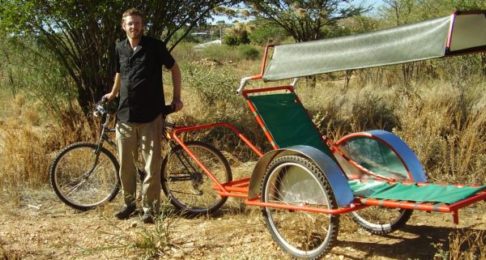
Links:
Bicycling Empowerement Network Namibia: http://benbikes.org.za/namibiaAaron's blog about his work in Namibia: http://namibikes.wordpress.com
Aaron's Flickr Site: flickr.com/photos/aaronwieler
Bicycle Ambulance promotional material: photo page and 3-page project description
Donate to BENN thorugh a 501(c)(3) non-profit ITDP Donation page for BEN Namibia
mynameisbill video podcast about BEN namibia www.mynameisbill.com
(featuring Aaron)
Bicycle Ambulance Project
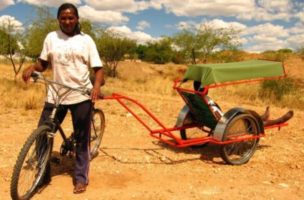
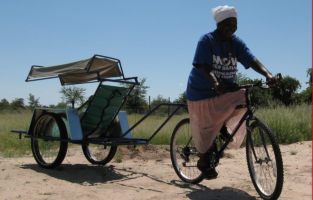
(Left) The production model of the BEN Namibia Bicycle Ambulance has wide tyres, a removable and adjustable stretcher, a handle for pulling by bicycle or hand, and a sun shade. Production began in March, 2007.
(Right) A Home Based Care Volunteer in Okathitu cycles through sand with a bicycle ambulance prototype during the development phase early in 2007.
Summary
BEN Namibia is producing bicycle-pulled ambulances for use by HIV/AIDS Home Based Care (HBC) workers, HIV/AIDS self help projects, communities, clinics, and hospitals in rural Namibia.
The project includes:
-
Establishment of a manufacturing facility at BEN Namibia's workshop in Windhoek.
-
Stakeholder identification and analysis. We are currently working with HBC networks in the North, Northeast, and Northwest of Namibia.
-
Prototyping of four different ambulance design iterations, with provision for active feedback and suggestions from stakeholders.
-
Producing a minimum of 36 additional ambulances in the first year.
-
Delivery of these ambulances to users, complete with training in their use, repair, and management.
-
Ongoing Monitoring and Evaluation.
-
Capacity-building workshops to build a distributed network of ambulance assembly, manufacture, and repair.
Background
BEN Namibia’s work delivering bicycles to home-based care volunteers in the North has demonstrated that there is an enormous need for emergency transport solutions for care of people living with HIV/AIDS. In other African countries where bicycle ambulances are in use, there have been increases in access to health care and marked declines in infant and maternal mortality rates. Because our ambulances are being used through HIV/AIDS HBC networks, we anticipate a high percentage of transports to be HIV/AIDS related. BEN Namibia is addressing the need for data on transport of HIV/AIDS patients.
Villages in Northern Namibia are often long distances from clinics and hospital. In much of Sub-Saharan Africa, emergency medical transportation is provided by improvised carts, wheelbarrows, and even stretchers. These transport options are slow and require more human resources than may be available.
Existing Work
In 2005 BEN Namibia built a demonstration bicycle ambulance and demonstrated it to home based care specialists, volunteers, and medical professionals who provided feedback about the local needs of the design.
To build on that work and incorporate suggestions from the stakeholders, Aaron Wieler, the Ambulance Project Coordinator, began work in October 2006 in the BEN Namibia workshop to establish a facility capable of first prototyping, and then producing bicycle ambulances. He has been prototyping ambulances incorporating local feedback and international experience. The ambulances are pulled behind any bicycle, and have stretchers that lift off so that the client can be carried into a clinic or over terrain impossible with a bicycle. They also have covers that provide privacy and protection from the sun, sand, mud, and rain.
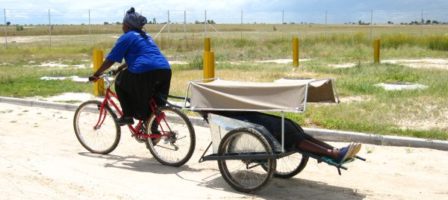
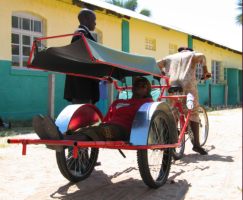
This prototype ambulance (left) is narrow for manoeuvring and has double-wide tires for use in sandy conditions.
Catholic Aids Action volunteers (right) learn safe ambulance operation skills during a delivery training.
In November 2006, BEN Namibia demonstrated our advanced ambulance prototype in Oshakati, Namibia, to Home Based Care Volunteers and organisers for TKMOAMS (a Home Based Care Network), staff and clients at the Waapandula Noyaka Centre, HBC workers with the Anglican Church in Okathitu, and a physical therapist at the Oshakati State Hospital. The ambulance was then delivered to a group of TKMOAMS Home Based Care Volunteers in the village of Okau for testing. The volunteers received training in the use of the ambulance, in addition to training in collection of usage and usability data. In the first two months of use, the ambulance was used for 45 trips (an average of 5 trips per week) between the Okaukumasheshe clinic and people's homes, for a wide variety of illnesses. Three other ambulance prototypes were delivered to HBC workers and healthcare workers in various locations in the North of Namibia.
The prototyping phase has resulted in BEN Namibia developing two ambulance products—a large ambulance with a removable stretcher that has an adjustable backrest angle, and a smaller ambulance with a fixed-angle stretcher that is also removable. We work with our partners to determine which style is most appropriate for their application.
BEN Namibia started this project with the support from the IBIS project, Yelula, for materials and tools through the initial prototyping period. A partnership is also under way with Design for Development, a Canadian charity that works to improve transport conditions for patients seeking medical attention in clinics and hospitals, and has built bicycle ambulances in Malawi.
Project purpose
BEN Namibia works to improve access to healthcare for Namibians living in rural locations where other transport is neither available nor appropriate. This is done primarily through the promotion of bicycles as tools for sustainable, efficient, and cost-effective transportation. By providing ambulances, training, and support to a variety of organisations working on health care, we are hoping to raise interest in the technology on a community scale. This project also provides potential for the creation of jobs though manufacture, distributed assembly, and operation.
BEN Namibia has coordinated the delivery of around 2000 bikes and training to health workers, and is providing ambulances and training though the same networks. Recipients receive training in ambulance repair, operational safety, bicycle maintenance, and management. We also facilitate discussions with the recipient organisations about management, anticipated problems, and expectations about the relationship with BEN Namibia. Through all these processes, new information about the effectiveness, impact, and problems with ambulance use are gathered and used to improve the project.
Project direction
We are now working to facilitate sponsorship of ambulances for Community Based Organizations (CBOs) in Namibia. We will provide the ambulances to communities with a need, along with training, monitoring, and ongoing support. We are working to directly connect communities with sponsors, to facilitate project ownership and community buy-in. With a production capacity of 6 ambulances per month, and we are seeking support to help us deliver ambulances to Healthcare Community Based Organizations in Namibia. With a bicycle, basic tool kit, manufacturing, delivery, training, and field support, the cost per ambulance is $530 USD.
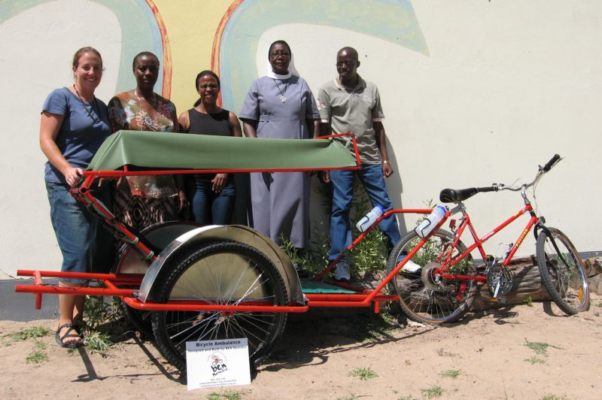
-
Bicycle Ambulance Budget
Cost Percentages
Material
29%
Transport/delivery to CBO
4%
Technical Labour and Fabrication
35%
Field support and training
20%
Bicycle for ambulance
12%
Totals: $530 USD
100%
More information:
We hope you can join us in our work to assist disadvantaged Namibians access health care, with the provision of appropriate and affordable medical transportation.
Please visit the BEN Namibia website, www.benbikes.org.za/namibia, call us at +264 61 250 200, or email the ambulance coordinator at ambulance@benbikes.org.za We would be happy to provide you with more information about our work.
Bicycling
Empowerment Network Namibia
PO
Box 23150
Windhoek,
Namibia
Unit
3, 1 Diehl St, Southern Industrial
Ph:
+264 61 250 200 Fax: +264 61 225 006 Cell: +264 081 339 0710
Email:
ambulance@benbikes.org.za
Web:
www.benbikes.org.za/namibia
Section
21 company not for gain no. 21 2005 0019
Click for Gallery of recent work, prior to my work in Namibia
email aaron
this is an open source design.
make a bike cart. use it. then make another one to give to a friend.

This work is licensed under a Creative Commons License.